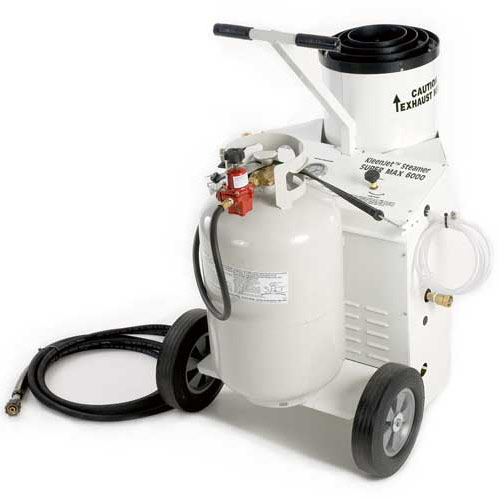How to Powerwash Stucco
Stucco exteriors are long-lasting and fairly easy to maintain, making stucco a popular choice for nonwood frame structures. Unfortunately, stucco is prone to mold and it tends to show dirt, which often splashes onto the siding during rain. Pressure washing is an easy way to clean this type of building exterior and it’s also recommended prior to painting. But it’s important to follow the proper steps when power washing stucco, because it’s easy to damage the surface if improper methods are used. When cleaning stucco, it’s best to use a power washer with a PSI (pounds per square inch) of 1200 to 1500 for painted siding. If the intention is to clean the wall in preparation for painting or if you’re pressure washing unpainted stucco, a PSI of 2500 can work well.
1) Remove any lawn furniture, signs and other items that are located against the stucco wall(s) that will be cleaned. If necessary, use bungee cords or twine to gather the stalks/leaves of foundation plantings within close proximity to the wall. This is only necessary for certain types of plants, like decorative grasses or small stalks of decorative bamboo.
2) Apply stucco patching mixture with a putty knife to holes or cracks in the stucco. Patching must be performed before stucco is power washed; otherwise, water can seep between the layer of stucco and the underlying surface, leading to disintegration.
3) Allow the stucco patches to set and dry. This may take anywhere from 24 to 48 hours, depending on the product. Check the product packaging for information on drying time.
4) Rinse the wall with a normal garden hose to remove superficial dirt; this will lessen the chance of eye injury and it will allow for effective pre-treatment of the stucco exterior.
5) Mix 1 part bleach and 3 parts water in a bucket, don rubber gloves and sponge the solution onto the stucco as a pre-treatment for areas of mold or heavily soiled areas. Allow the solution to sit for at least 30 minutes before proceeding.
6) Attach the garden hose (while the water supply is off) to the power washer. The water attachment port is usually clearly labeled; it’s usually located on the top or back of the power washer.
7) Fill the power washer with fuel (if it’s a cordless model) or plug it in if it’s an electric model. An outdoor extension cord may be required for electricity-powered models. If you are using a model that has a detergent reservoir, this is when you should fill the reservoir. The reservoir location varies from model to model, but it’s often a plastic jug located near where the wand feed attaches to the pressure washer.
8) Don protective goggles and a face mask.
9) Turn on the water supply (full volume) and then turn on the power washer.
10) Grasp the base of the power washer’s wand and aim the nozzle (at the end of the wand) into the air, away from people, plants, structures, etc. and depress the trigger. This must be done within approximately 5-10 seconds of turning on the pressure washer; otherwise, pressure will build in the line leading to the wand and it will require a lot of strength to depress the trigger.
11) Keep the trigger depressed and move the stream of water to one of the top corners of the wall and begin cleaning the stucco by moving the water stream back and forth in 1-foot strokes as you slowly walk along the length of the wall. You must power wash in “strips” moving across the wall; start at the top and work your way down to the bottom of the wall. The nozzle must be at least 12 inches away from the wall to avoid damage to the stucco.
12) Rinse the wall with a normal garden hose (from top to bottom) after power washing if you’re preparing the wall for paint or if you used a detergent during the power washing process.
13) Allow the wall to dry and then apply paint to the patched areas of stucco and to any bare areas where the paint was removed during the power washing process. Power washing will remove loose paint. You may accidentally take off the paint if you place the pressure washer’s nozzle too close to the siding. Skip this step and proceed with normal painting procedures if you are washing the stucco in preparation for a painting project.
Read more: How to Power Wash Stucco | eHow.com http://www.ehow.com/how_5924227_power-wash-stucco.html#ixzz1Y2IHTR9R
If you are in the Greater Philadelphia area and are in need of pressure washing, power washing, window cleaning, graffiti removal or vehicle cleaning services, contact our Philadelphia Pressure Washing company at 215-703-8306.

